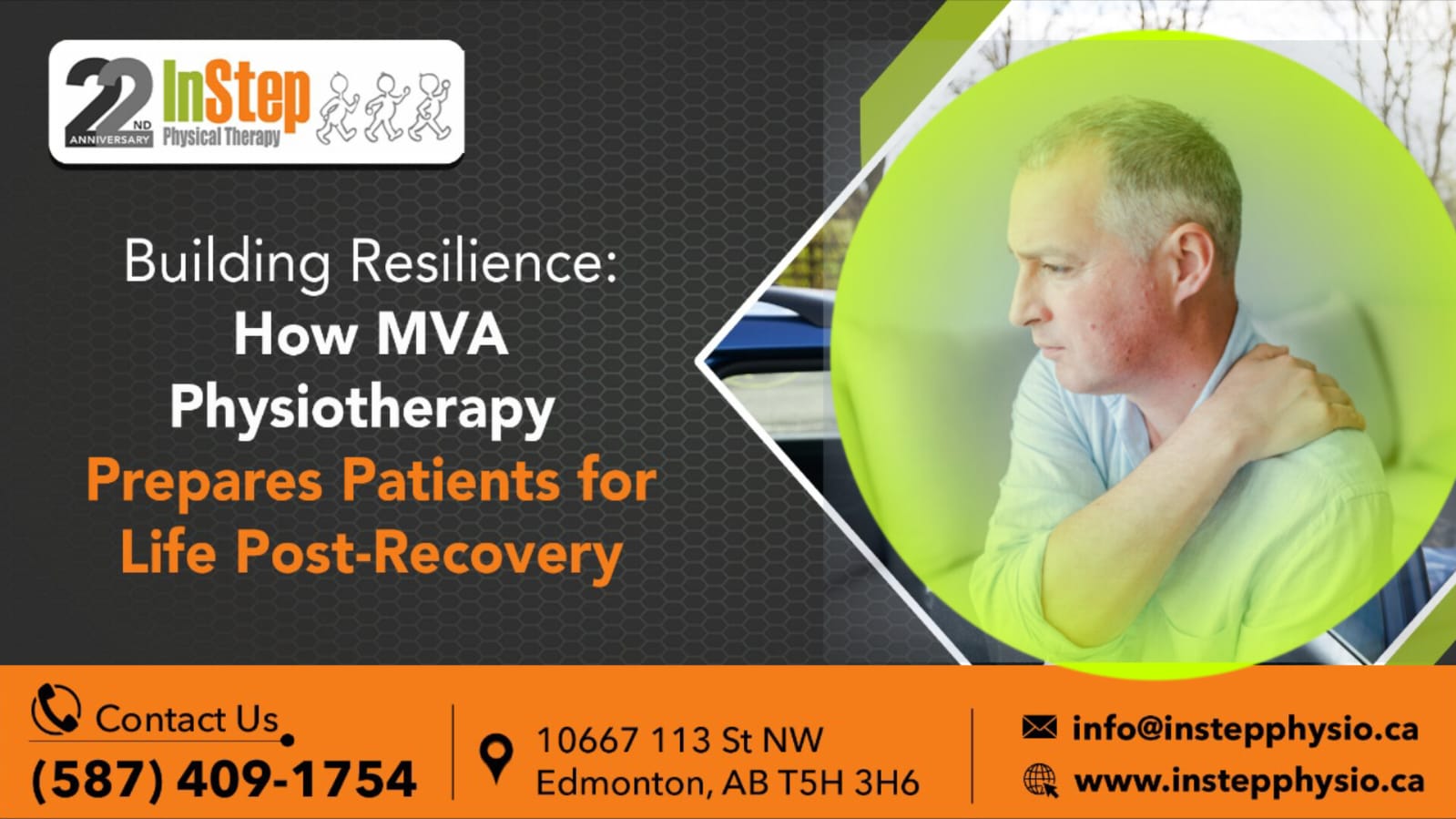Building Resilience: How MVA Physiotherapy Prepares Patients for Life Post-Recovery

Recovering from a motor vehicle accident involves much more than healing physical injuries. Motor vehicle accident physiotherapy in Edmonton offers a comprehensive approach to rehabilitation, focusing on the immediate aftermath of an accident and preparing patients for a resilient return to their pre-accident lifestyle.
MVA physiotherapy specializes in addressing the wide range of issues that survivors face, from physical ailments and mobility restrictions to the psychological impacts of their experience. Dedicated physiotherapists work alongside patients through personalized treatment plans, guiding them through each step of their recovery process.
Enhancing Life Post-Recovery
MVA physiotherapy at In Step Physical Therapy in Edmonton adopts a comprehensive approach, addressing the multifaceted needs of patients who have experienced car accidents. This rehabilitation process goes beyond treating physical injuries, incorporating strategies to strengthen patients’ mental and emotional resilience.
Customized Exercise Strategies
A suite of specifically designed exercises is introduced to gradually rebuild strength, enhance flexibility, and restore overall mobility that the accident’s impact may have compromised.
- Strength Building: These exercises aim to rebuild muscle strength that was lost or diminished due to the accident. Examples include weight lifting and resistance band exercises tailored to the patient’s capabilities.
- Flexibility Improvement: Incorporating gentle stretching exercises helps in restoring flexibility. Yoga and Pilates can be part of this regimen, focusing on gently extending and bending different body parts to increase the range of motion.
- Mobility Restoration: Gradually incorporating activities such as walking, stationary biking, or elliptical training helps improve cardiovascular fitness and mobility, ensuring the body is not overburdened.
- Endurance Training: Incorporating cardiovascular exercises such as walking, cycling, or swimming at a low intensity and progressively increasing the duration and intensity. This enhances cardiovascular health and muscular endurance.
- Balance and Proprioception Exercises: Activities that improve balance and body awareness are critical. These include exercises on a balance board or using a BOSU ball. Enhancing proprioception helps reduce the fear of falling or re-injury.
Mimicking Everyday Movements
These rehabilitative exercises are crafted to simulate routine daily tasks.
- Task Simulation: Exercises might include bending to simulate picking objects up from the floor, reaching exercises to emulate putting items on a shelf, and walking or stepping exercises to improve the ability to navigate stairs.
- Functional Movement Patterns: Practicing getting in and out of a chair or bed, simulating opening doors, or mock grocery shopping can help regain the confidence and physical ability to perform everyday tasks.
- Stair Climbing and Negotiation: Properly practicing going up and down stairs is crucial for many daily activities. It also helps build confidence and the ability to navigate different environments.
Managing Pain and Facilitating Comfort
- Hands-on Relief Through Manual Therapy: Physiotherapists employ various manual therapy techniques to relieve pain, enhance blood flow, and foster the recovery of movement in areas affected by the accident.
- Modalities for Pain Relief: Incorpoting-edge therapeutic modalities like ultrasound and Transcutaneous Electrical Nerve Stimulation (TENS) significantly diminish pain and inflammation, further propelling recovery.
Psychological Support and Coping Strategies
- Emotional Rebuilding through Counselling: Recognizing the psychological impact of motor vehicle accidents, physiotherapy programs incorporate counselling sessions. These sessions aim to support individuals in navigating the emotional and psychological hurdles encountered during the recovery phase.
- Stress Reduction Through Mindfulness: Incorporating mindfulness practices and relaxation to manage stress and anxiety, enhancing their psychological resilience, effectively equips individuals with the tools to manage stress and anxiety effectively.
Preparing for Long-Term Health
- Risk Assessment and Management: Physiotherapists conduct thorough assessments to identify factors that may increase the patient’s risk of future injuries or complications. Based on these assessments, personalized strategies are developed to mitigate these risks, which may include modifications to the workplace or home environment and changes in lifestyle habits.
- Addressing Pre-existing Vulnerabilities: Often, motor vehicle accident physiotherapy in Edmonton can reveal vulnerabilities in the body’s musculoskeletal system. Part of the preventative approach involves strengthening these vulnerable areas to ward off future issues, employing targeted exercises and therapies.
Ongoing Support and Adaptation
- Continued Physiotherapy Support: Even beyond the acute rehabilitation phase, individuals must have access to periodic evaluations. These assessments allow physiotherapists to monitor progress, identify any emerging challenges, and make necessary adjustments to exercise routines, ensuring that the patient continues to advance towards full recovery without setbacks.
- Adaptive Exercise Modifications: As individuals progress in their recovery journey, their physical capabilities and needs may change. Continuous physiotherapy support includes adapting exercise programs to meet these evolving requirements. This approach ensures that rehabilitation exercises remain challenging and achievable, promoting steady improvement in strength, flexibility, and overall physical health.
Supportive Networks and Peer Support
Physiotherapists may connect patients with support groups for individuals who have experienced similar injuries or accidents. These communities offer a space to exchange stories and insights and support challenges and coping strategies. Peer support plays a significant role in emotional recovery, offering encouragement and understanding from individuals with firsthand experience of similar challenges.
Enduring Impact of MVA Physiotherapy
In conclusion, the role of motor vehicle accident physiotherapy, as expertly provided in Edmonton, transcends the boundaries of traditional rehabilitation. Through targeted car accident physiotherapy interventions, patients are equipped with the necessary tools and strategies to confront and overcome the challenges that lie ahead in their post-recovery lives.
In Step Physical Therapy stands as a beacon of hope and recovery for those affected by motor vehicle accidents. We offer personalized care that prioritizes restoring function, strength, and confidence.
For anyone embarking on the path to recovery following an MVA, embracing the specialized support offered by motor vehicle accident physiotherapy in Edmonton is a crucial step towards reclaiming control of their life. Reach out to In Step Physical Therapy today and begin the journey back to health, strength, and resilience, armed with the support of a team committed to your recovery and long-term well-being.






